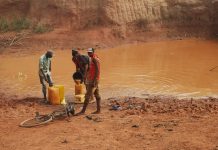By ibrahima yakubu
Northern Nigeria is grappling with a growing crisis as the impacts of climate change force thousands of people into dire living conditions, making urgent psycho-trauma counseling a necessity.
Climate change, driven by various factors including deforestation, desertification, and unsustainable land use practices, has led to the displacement of countless Nigerians in the northern regions. Without swift action, this could escalate into a daunting challenge, creating a wave of climate-induced refugees.
Addressing this pressing issue necessitates the cooperation of all stakeholders, including humanitarian organizations, and governments at all levels. The plight of these displaced individuals cannot be ignored any longer.

Millions have been uprooted from their homes due to climate-related disasters and ecological challenges. The activities of miners, for instance, have resulted in severe pollution and degradation of the environment in rural areas, further exacerbating the problem.
After a comprehensive investigation spanning five years, African Climate Reporters have uncovered the harsh realities of climate change, environmental degradation, and its impact on millions in the North Eastern and North Western regions of Nigeria. These factors have pushed many into becoming refugees, while others are struggling to survive in overcrowded IDP camps.
The situation is dire, and it’s only expected to worsen as climate change intensifies, coupled with recurring conflicts between farmers and herders.
For families residing on the outskirts of cities, windstorms triggered by deforestation in nearby areas have forced them to abandon their homes.
Dr. Hoffman Piman, Director of African Climate Reporters Nigeria, points out that climate change, coupled with activities like charcoal production and illegal timber harvesting, threatens Nigeria’s forests. The relentless demand for firewood in bakeries, prisons, and for domestic use is also driving wildlife away from their natural habitats.

Climate change is predicted to be a primary driver of migration and displacement in the coming decades. Extreme weather events are increasingly forcing people to evacuate their homes temporarily or relocate permanently.
Desertification, which has severely impacted Nigeria, has led to the displacement of countless individuals. Deforestation, driven by urbanization and industrialization, has pushed urban populations into rural areas in search of stability.
Dr. Yusuf Nadabo, a prominent climate expert, emphasized the urgent need to combat desertification and deforestation. He called upon the Kaduna State government to enforce stricter penalties for illegal tree felling and bush burning to address the root causes of deforestation.
Millions in northeastern Nigeria have been compelled to migrate due to the devastating effects of desertification on their farmland and environment.

To tackle the alarming pace of desertification, widespread tree planting campaigns and public awareness initiatives are essential. Sustainable land management practices, along with soil and water conservation efforts, must be promoted to counteract the desertification process.
In Nigeria, as in many other parts of the world, understanding the causes and solutions to the climate crisis is vital. Raising awareness among the public, communities, and organizations is crucial to mobilizing action.
It’s important to note that climate-induced displacement in Nigeria presents unique challenges. While the UN’s refugee definition focuses on international borders, many Nigerians are forced to migrate within their own country due to climate change impacts. This complex issue calls for innovative solutions and greater recognition at both national and international levels.
The consequences of climate change disproportionately affect vulnerable communities, leading to food and water scarcity, loss of livelihoods, reduced access to education, and increased gender-based violence, all of which perpetuate poverty.
In Nigeria, there is a pressing need to implement climate adaptation measures, such as Climate-Smart Agriculture and nature-based solutions. Furthermore, strengthening community-based natural resource management and disaster risk management systems is crucial for sustainable resilience.

In conclusion, the state government emergency organization are doing all the necessary with other stakeholders to mitigate crisis conflicts through public awareness on the importance of trees planting while discouraging women on the used of firewood for cooking



















